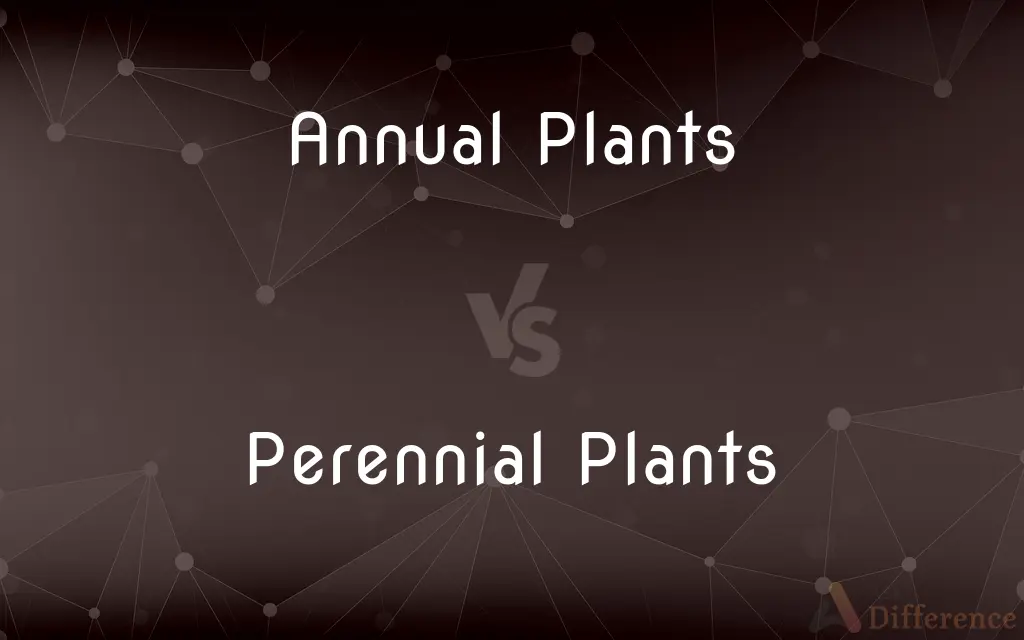Annual Plants vs. Perennial Plants — What's the Difference?
Edited by Tayyaba Rehman — By Fiza Rafique — Published on December 18, 2023
Annual plants complete their life cycle in one growing season and then die, while perennial plants can live and bloom for more than two years, often for several seasons.

Difference Between Annual Plants and Perennial Plants
Table of Contents
ADVERTISEMENT
Key Differences
Annual Plants germinate, bloom, produce seeds, and die all within a single growing season. In contrast, Perennial Plants can persist for several growing seasons, returning year after year.
When planting Annual Plants, gardeners understand that these plants will need to be replaced every year. Perennial Plants, however, provide the advantage of not needing to be replanted each season, as they reemerge from their rootstock.
From a maintenance perspective, Annual Plants often require more frequent attention since their entire life is condensed into one season. Perennial Plants generally have a more extended bloom time and can be more self-sustaining once established.
In terms of adaptation, Annual Plants have evolved strategies to ensure that their seeds survive to germinate the next year. Perennial Plants, on the other hand, invest in strong root systems that enable them to withstand varying conditions over years.
Annual Plants offer the benefit of quick color and variation in gardens, allowing for yearly redesign. Perennial Plants, however, offer consistency and can become mainstays in gardens due to their long-lasting nature.
ADVERTISEMENT
Comparison Chart
Lifespan
One growing season
Several years or growing seasons
Maintenance
Typically need more frequent attention
Can be more self-sustaining once established
Root System
Generally more superficial
Often deeper and robust
Adaptation
Evolved for seed survival
Evolved for longevity
Garden Role
Quick color and yearly variation
Consistency and long-lasting presence
Compare with Definitions
Annual Plants
Plants often chosen for their ability to provide quick color and variation in gardens.
Gardeners often mix Annual Plants like petunias with other plants for dynamic displays.
Perennial Plants
Plants that provide consistency in gardens due to their long-lived nature.
Rose bushes, as Perennial Plants, can become garden staples for many years.
Annual Plants
Plants that germinate, flower, and die within one year.
Sunflowers are Annual Plants that can tower above other garden flowers.
Perennial Plants
Plants that live for more than two years or growing seasons.
Lavender is a Perennial Plant that returns year after year with fragrant blooms.
Annual Plants
Plants that require replanting every year for continued growth.
Many vegetable crops, like tomatoes, are considered Annual Plants.
Perennial Plants
Plants that reemerge from the same rootstock over multiple seasons.
Peonies are Perennial Plants known for their large, colorful blossoms.
Annual Plants
Plants that produce seeds as their primary means of reproduction for the following year.
After flowering, Annual Plants like poppies will produce seeds for the next season.
Perennial Plants
Plants that can withstand varying conditions over years and still return.
Despite harsh winters, many Perennial Plants like daylilies bounce back in the spring.
Annual Plants
Plants that complete their life cycle in a single growing season.
Marigolds are popular Annual Plants that add vibrant color to summer gardens.
Perennial Plants
Plants often recognized for their robust root systems aiding their longevity.
Hostas are Perennial Plants that thrive in shady garden spots and have strong root systems.
Common Curiosities
Why do some gardeners prefer Annual Plants?
Gardeners may prefer Annual Plants for their ability to provide quick color and allow for yearly garden variation.
Is it easier to change garden design with Annual or Perennial Plants?
It's easier to change garden design with Annual Plants since they need replanting each year.
Do Perennial Plants bloom the first year they are planted?
Some Perennial Plants may bloom the first year, but others might take a year or more to establish and start flowering.
Can Perennial Plants survive harsh winters?
Many Perennial Plants can survive harsh winters and return during the appropriate growing season.
Do Perennial Plants require regular maintenance?
While Perennial Plants can be more self-sustaining, they may still require periodic care, such as pruning or dividing.
Do I need to replant Annual Plants every year?
Yes, Annual Plants complete their life cycle in one season and need to be replanted, unlike Perennial Plants.
Which plants are more self-sustaining once established?
Perennial Plants are generally more self-sustaining once established than Annual Plants.
How do Annual Plants ensure their species' survival?
Annual Plants produce seeds as their primary means of ensuring they will return the next season.
What is the primary difference between Annual Plants and Perennial Plants?
Annual Plants live for one growing season, while Perennial Plants live for several seasons.
What is a benefit of the root system of Perennial Plants?
The robust root systems of Perennial Plants help them withstand varying conditions and support their longevity.
Are there plants that don't fit neatly into the Annual or Perennial category?
Yes, there are biennials, which have a two-year life cycle, and other plants that may not fit strictly into either category.
Are there any cost advantages to growing Perennial over Annual Plants?
Perennial Plants might offer cost savings over time since they don't need to be repurchased and replanted each year like Annual Plants.
Can I grow both Annual and Perennial Plants in the same garden bed?
Absolutely, many gardeners mix Annual and Perennial Plants for a balanced and dynamic garden display.
Do Perennial Plants flower all year round?
No, Perennial Plants typically have a specific bloom period within the growing season.
Why might some Annual Plants appear the following year?
Some Annual Plants can self-seed, which allows them to sprout the following season.
Share Your Discovery

Previous Comparison
Distributive Negotiation vs. Integrative Negotiation
Next Comparison
Telophase 1 vs. Telophase 2Author Spotlight
Written by
Fiza RafiqueFiza Rafique is a skilled content writer at AskDifference.com, where she meticulously refines and enhances written pieces. Drawing from her vast editorial expertise, Fiza ensures clarity, accuracy, and precision in every article. Passionate about language, she continually seeks to elevate the quality of content for readers worldwide.
Edited by
Tayyaba RehmanTayyaba Rehman is a distinguished writer, currently serving as a primary contributor to askdifference.com. As a researcher in semantics and etymology, Tayyaba's passion for the complexity of languages and their distinctions has found a perfect home on the platform. Tayyaba delves into the intricacies of language, distinguishing between commonly confused words and phrases, thereby providing clarity for readers worldwide.
















































